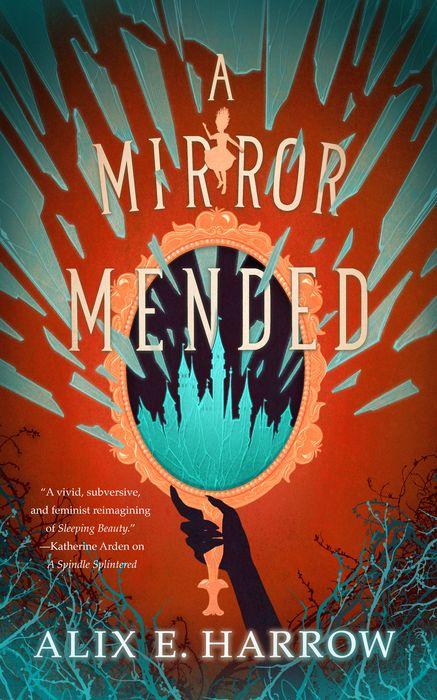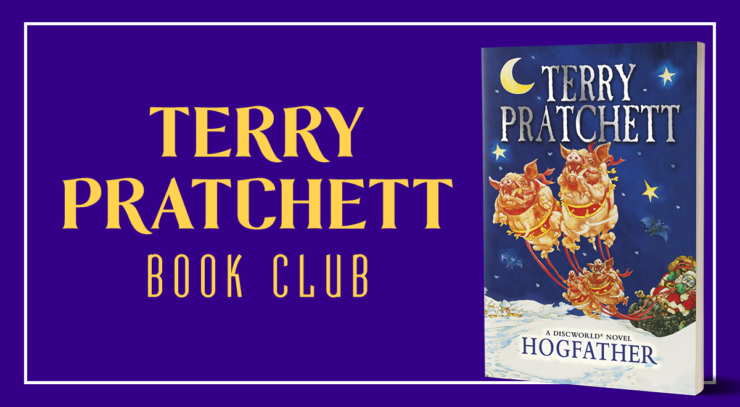Someone hand me a pork pie and some sherry, it’s time to deliver gifts.
Summary
The Auditors are concerned at Susan stepping into this affair, but they’re certain they’re correct despite their lack of authorization—they have a duty to “rid the universe of sloppy thinking.” Susan goes to Death’s house and finds a bunch of cats now living there. She heads to the Lifetimer room and sees a door she’s never noticed before. On the other side of it are intangible timers for gods and anthropomorphic manifestations. There’s a broken one for the Hogfather. Ridcully tries out the new bathroom, despite protests from his colleagues, and it goes mostly well. The Verruca Gnome shows himself after the shower and Ridcully takes his bag, which the gnome warns him not to open. Albert suggests that Death make an appearance at that Hogfather Grotto to stoke belief, so they touch down and destroy Vernon Crumley’s setup, Death sits in the Hogfather’s seat, and he begins taking the demands of children, giving one a real sword (that Albert gets him to change to wood, though he hardly understands the point). Ridcully goes to Ponder about the Verruca Gnome, and accidentally stumbles upon an experiment trying to make Hex talk with the Bursar.
Buy the Book


A Mirror Mended
Susan goes to the Hogfather’s shelves (not just a single book) in Death’s library and starts reading up, learning that he used to be a different sort of god, one associated with hunts and beans and making the sun come up in winter. She moves to the latest tome and gets the clear sense that the Hogfather wants to be left alone, but the Death of Rats suggests that if she wants to find the Hogfather, she should go to the Castle of Bones, where all the children’s letters are supposed to go. Teatime’s team largely don’t trust him, but they’re sticking with their plan in the hope of getting the money he promised. Death gives a little girl a pony for Hogswatch. Susan makes it to the Castle of Bones, which is made of ice, and notes that something about the place seems wrong. While there, she discovers a boy named Bilious, the Oh God of Hangovers. The Castle of Bones collapses as she gets him out, and he explains that he gets all the hangovers that people avoid when they drink. Susan notes that the Castle of Bones isn’t just destroyed, it’s as though it never existed in the first place.
Mr. Crumley calls in the Watch to have them take away the Hogfather imposter. Nobby and Constable Visit show up, only they note that it’s probably not a great look to arrest the Hogfather in front of children while he’s giving away presents for free. Crumley asks them to do it stealthily, but Nobby winds up having another idea, as someone who never got gifts from the Hogfather as a child. Ridcully thinks that the wassailers are at the University door, but it turns out to be Susan and Bilious and company. She asks for help sobering Bilious up so he can maybe tell her what’s going on, which leads the wizards to combine every hangover cure they can think of into one beaker, wow-wow sauce included. Bilious chugs the whole thing, and the effects are felt by the God of Wine (whose hangovers Bilious suffers through). Nobby sits in the Hogfather’s lap and finds he cannot speak, but he gets a gift, which turns out to be an extremely fancy crossbow he’d been coveting, so arresting the Hogfather isn’t seeming like a great idea anymore. Susan begins talking to Bilious and they realize that Ridcully created him by mentioning a god of hangovers—you can now invent any sort of god by naming them, provided they seem like a likely one to exist.
Unfortunately, the second god they think to bring into being is the thing that steals socks from the laundry. The wizards head downstairs to look for it, and it turns out much large than they were anticipating… Death and Albert have left the Grotto and are continuing to deliver presents, but the next one on their list is a homeless match girl, who is about to die in the cold; Death is taken aback. He goes to the girl and gives her lifetimer more life, which Albert insists he can’t do—but Death is the Hogfather tonight and the Hogfather gives gifts. He hands the girl over to Nobby and Constable Visit, telling them to take her somewhere warm and feed her. The wizards head to Ponder to ask what’s going on with reality, but Hex has caught daftness from the Bursar. Ridcully tells it that they’ve given it a bunch of dried frog pills, which seems to sort it out. Hex tells them that reality is wonky due to issues about Anthropomorphic Personifications and that the new gods are appearing because there’s no reason for them not to exist. Ponder accidentally creates the personification of the thing that eats the stubs of pencils.
Commentary
There is nothing I love more about this book than the decision to take “The Little Match Girl” and reveal it for the disgusting, heartless bullshit that it is.
This is not Hans Christian Andersen’s fault (and yes, I know this story has other older versions, but he did write the popular one that most people are referring to when it’s brought up): The man was a sad queer artist who genuinely wanted people to pay attention to the poor and destitute, and it’s not his fault that generations have misinterpreted many things he wrote. Do I hate the ending of “The Little Mermaid”? I truly do! But knowing that the mermaid was probably kinda him makes a difference in how you interpret that story. If we had a dime for every time a gay or homoromantic man used a shunned woman/girl as a metaphor for how he was treated… look, we’d have so many dimes, it’s a genre. And a legit one, honestly; I am all for people blurring gender lines in an effort to understand themselves better.
But the fact remains that so many Christians have used this story as a “heartwarming” fable because the girl goes to heaven and she’s happy despite the fact that society allowed her to die frozen in the street. As Albert says, it’s a reminder to be grateful for what you have on Hogswatch Night. It’s meant to be uplifting because the girl is rewarded and everyone can feel a little bit better (read: superior) for the fact that they’re not about to die alone and unmarked.
Death takes one look at this utterly fucked Omelas-esque parable and throws the book at us, metaphorically speaking. In this moment he is something beyond Death and beyond the Hogfather—because he may have the guy’s powers for the night, but it’s not like the jolly old man ever stopped this story from playing out, right? Everyone on the Disc knows it because it happens, maybe not every year, but many of them. The Hogfather isn’t putting an end to it because it’s literally a part to the belief system keeping him alive.
Think about that for a moment. The implications of that.
But Death is kind—kinder than any of us. Death is the one who wants to rescue kittens from drowning when people are the ones responsible for throwing them down the well. If there’s any kind of loophole that can prevent this from happening, he’s going to take that out, and Albert can shut up and help. So can the Watch. The kid gets a future and a hot meal and some place to stay for the night.
This is where the meat of the story lives, outside all the (deeply enjoyable) machinations of the plot. Because it’s probably true that belief is what powers reality—but that doesn’t mean all beliefs are good. Plenty of them are malignant and odious and harmful, and it’s important to know the difference. Using Christmas as the framework for that lesson makes it very easy to showcase the line: We’ve got the tender dreams of children juxtaposed with rash consumerism, we’ve got togetherness juxtaposed with isolation, celebration juxtaposed with incomparable excess. Hogswatch shows all the hallmarks of this whiplash we’re subjected to every time the holiday rolls around.
Death has a better measure of what belief should be than anyone, when he tells Albert that he appreciates the way the children indicate belief before him:
“You mean sort of fear and awe and not knowing whether to laugh or cry or wet their pants?”
YES. NOW THAT IS WHAT I CALL BELIEF.
We’ll get to everything that Susan’s up to as we continue, but I wanted to stop and talk about that this week. Something chewy to get you through the weekend.
Asides and little thoughts:
- Sorry, just the acknowledgement that Death never locks the back door of his home. The collection of cats. I’m not crying you’re crying.
- How did it just now occur to me that The Nightmare Before Christmas was probably another influence here? Jack Skellington is a literal skeleton taking Santa’s place. And he messes it up in a very similar way. (“Cower, brief mortals” definitely sounds like a thing Jack would’ve said.)
- The doll display playing a tune called “Wouldn’t It Be Nice If Everyone Was Nice” has very “It’s a Small World After All” vibes and the sentiment of the Discworld version is spot on in terms of vacancy and meaninglessness.
Pratchettisms:
If he really picked things up from humans, had he tried insanity? It was very popular, after all.
The effect was like getting a toothache in your eyeballs.
The sentence hung in the air with its hand out.
The wizards spread like an opening flower. One moment they were gathered around Ridcully, the next they were standing close to various items of heavy furniture.
The wizards began to stand up and brush themselves off, giving one another the rather embarrassed grins of people who know that they’ve just been part of a synchronized making-a-fool-of-yourself team.
There was hardly anything left of Nobby’s conscious will now. The world consisted of nothing but his naked soul and the Hogfather, who filled the universe.
“Valuable contribution, that man,” said Ridcully, giving up on the Dean. “Right, pass the word along: no one is to look like a sock, understand?”
Shortly afterward there was some tinkling music and a very bright light and two rather affronted angels appeared at the other end of the alley, but Albert threw snowballs at them until they went away.
Next week we read up to:
“You know why they’ve got all those teeth in a circle? The power… oh, my…”










